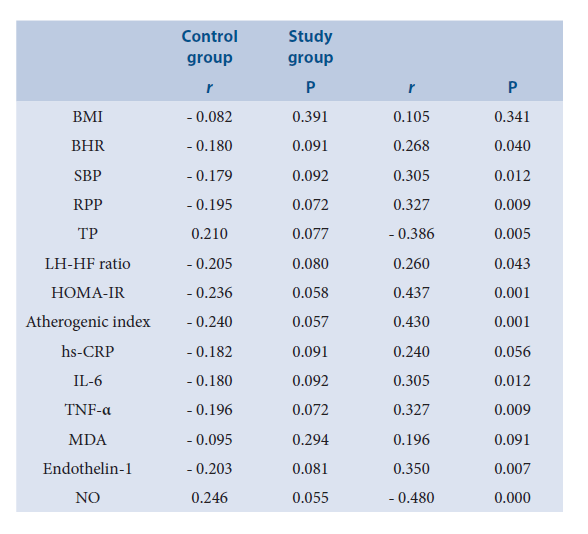Sympathovagal imbalance, cardiometabolic risks and hypertension status are linked to depression in women having risk factors for pregnancy-induced hypertension
Abstract
Background and Aim: Pregnancy is a physiological state in which there are cardiovascular, autonomic, hemodynamic and psychological changes. Increase in incidence of stress and depression in antenatal period has been reported. Autonomic changes in pregnancy-induced hypertension (PIH) and its dysfunction in depression are well documented. However, there is no report of contribution of sympathovagal imbalance (SVI) and cardiometabolic alterations to stress and depression in PIH. Methods: In this case-control study, we assessed and analyzed cardiovascular autonomic functions including heart rate variability (HRV) and cardiometabolic risks (CMR) between pregnant women having risks of PIH (n=62) and normal healthy pregnant women (n=68). The perceived stress scale (PSS-10) and Quality of Life (QoL) were used to evaluate depressive symptoms and perceived stress. The HRV and CMR parameters were correlated with PSS. Multiple regression analysis was performed individually to study their association with PSS. Logistic regression was done to determine the prediction of hypertension/prehypertension status by PSS. Results: There was increase in heart rate and blood pressure, decreased HRV and increased markers of insulin resistance, atherogenic lipid profile, markers of inflammation, oxidative stress and vascular endothelial dysfunction in PIH risk subjects compared to control subjects. Parameters of SVI and decreased cardiovagal modulation and CMR were significantly correlated and associated with PSS. PSS had independent prediction of prehypertension/hypertension status in the study group. Conclusion: Findings of the present study indicate that there is considerable SVI and CMR in PIH. It appears that depression is the major cause of SVI and decreased cardiovagal modulation in PIH, and retrograde inflammation and vascular endothelial dysfunction could be the potential mechanisms of depression mediated SVI in PIH.

Copyright (c) 2021 Gopal Krushna Pal, Syed Habeebullah, Manivannan Subha, Pravati Pal

This work is licensed under a Creative Commons Attribution-NonCommercial-NoDerivatives 4.0 International License.





